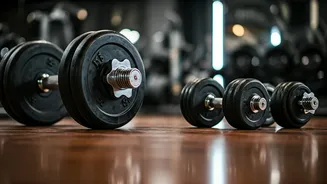Dispelling the Myth
The notion that women will automatically bulk up by lifting weights is a widespread misconception that has been around for many years. It is important
to know that building muscle is a complex process. It is determined by a number of variables, including training methods, dietary habits, and hormonal influences. The objective is to dispel the idea that lifting weights alone will cause women to become bulky and to provide a clearer understanding of how to achieve the desired outcomes. This discussion will highlight the significance of understanding these variables to make wise decisions and attain the intended physical outcomes.
Training Style Matters
Training style is a crucial aspect when it comes to strength training and its effects on the body. Focusing on the type of workout is crucial to attain desired outcomes, such as building strength without adding excessive size. The exercises performed, the number of repetitions, the sets, and the amount of rest between sets, are very important. Training sessions that are focused on high reps with lighter weights are likely to increase muscle endurance. This method is unlikely to lead to substantial muscle growth. On the other hand, the combination of lower reps with heavier weights may result in greater muscular hypertrophy. Women can customize their training program to achieve their goals by understanding these nuances.
The Nutrition Factor
Nutrition plays an extremely vital role in determining whether a person gains size or strength. The amount of calories consumed daily has a direct impact on the way a person's body responds to strength training. A calorie deficit, where fewer calories are consumed than burned, can support fat loss while maintaining muscle. Consuming more calories than one burns can promote muscle growth when coupled with strength training. Macronutrient composition is also important. Protein is vital for muscle repair and growth, and sufficient intake is crucial. Adjusting carbohydrate and fat intake based on training intensity and goals further contributes to overall physique goals. Proper nutrition is crucial for women who wish to alter their bodies through strength training.
Hormonal Influences
Hormones have a significant impact on how the body reacts to strength training. Women have different hormonal profiles compared to men, which influences their capacity to develop muscle mass. Testosterone is the primary hormone for muscle growth, and women usually have considerably lower levels than men. This indicates that women are less likely to experience the same degree of muscle growth as men. These natural differences affect the physiological responses to strength training. Other hormones, such as estrogen, also affect muscle development and fat distribution, making it easier for women to maintain a leaner physique. Recognizing the influence of hormones enables women to create realistic expectations and modify their training appropriately.
Building Strength Empowers
Strength training is extremely empowering for women. It helps in building strength and enhances physical and mental well-being. Regular weightlifting improves bone density, decreases the risk of osteoporosis, and boosts metabolism. Strength training can have a positive impact on body composition, posture, and self-confidence. Embracing strength training encourages a more positive body image, allowing women to feel more comfortable and confident in their skin. By emphasizing the benefits of strength training beyond physical appearance, women are encouraged to view fitness as a journey towards overall health and vitality. This approach promotes a more holistic and fulfilling fitness experience.














